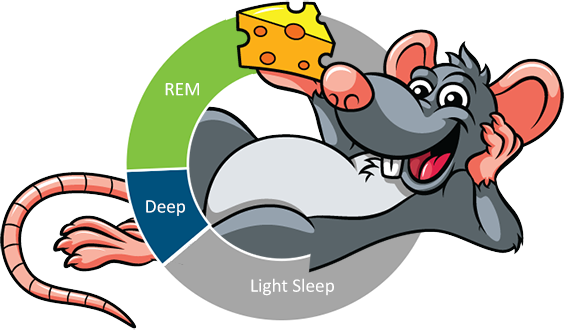
Is sleep tracking the most over-rated feature on smartwatches? Is it really actionable, or simply data for the sake of data…
I dreamt of rats last night. Not just one rat, or even two. No, in my dream there was a line of rats almost as far as the eye could see, and in the distance was an unfamiliar farmhouse, towards which they were marching, one-by-one, with military precision. My role in this dream was that of a passive observer. I was no Pied Piper: I just stood there and watched as the rats invaded the house.
The dream was all the more disturbing because I’d actually been watching a farming show earlier in the evening, about sheep herding. There was not a rat in sight, and I was very much under the impression that counting sheep was supposed to help you sleep. Of course, I was also under the impression that sleep tracking on my smartwatch was supposed to provide some value but today, after a very restless night, I received a sleep score of 83% and managed just over an hour of deep sleep. I also managed more than 150 minutes of REM sleep, which means I could have been watching those rats invade the farm for an uncomfortable amount of time. More to the point, having analyzed this sleep data in a post-rat haze, I have decided that the whole thing is hogwash.
Oh, I’m not saying it is wrong per se. The lengthy REM sleep made sense for the dream, but it certainly wasn’t a peaceful, untroubled dream: the sleep score of 83% must have been rated by an algorithm that enjoys a horror movie or two. I, on the other hand, do not. And I’m hardly full of the unbridled energy today that such a score should bring. In other words, I don’t need a sleep tracker to tell me that my night was rough.
So that brings me to the philosophical issue regarding smartwatches: what is the point of some of the tracking? Just because they track our movements does not necessarily mean we can do anything to change the results. Is the data actionable? Some obviously is: if my watch tells me that I haven’t taken enough steps during the day I could go for an extra stroll. But sleep data? I’m less convinced. After a bad night of sleep, what am I supposed to do? I could take it easy the following day and use the results as a rather good excuse to skip the gym, but I’m sure that the watch will inevitably reprimand me later in the day for skipping my cardio. More to the point, what should I do the next evening to improve my sleep (apart from possibly avoiding sheep herding shows)?
According to NPD’s Connected Intelligence Wearable Ownership Report, 33% of smartwatch-toting consumers say that they track sleep every day, and 65% of consumers looking to buy a smartwatch consider sleep tracking to be an extremely or very important purchase consideration. Which of course brings up the obvious question of when exactly we are supposed to charge the device? Pulling it off our wrist for an hour or more means losing count of our steps or other features. The ideal time to charge the watch does seem to be while sleeping. The solution could be to double down, buying a separate sleep-tracking device. But the question remains: is the data truly actionable and, if not, why track it at all?
So, the good news out of this is that now I know when to charge my watch. And more importantly, it has helped me realize that tracking statistics simply for the sake of self-tracking is a little pointless. And you never know, without a watch strapped to my wrist at night, perhaps I would sleep more soundly. And if not… well, I’m hoping to at least upgrade to a nicer species of animal for tonight’s dream.